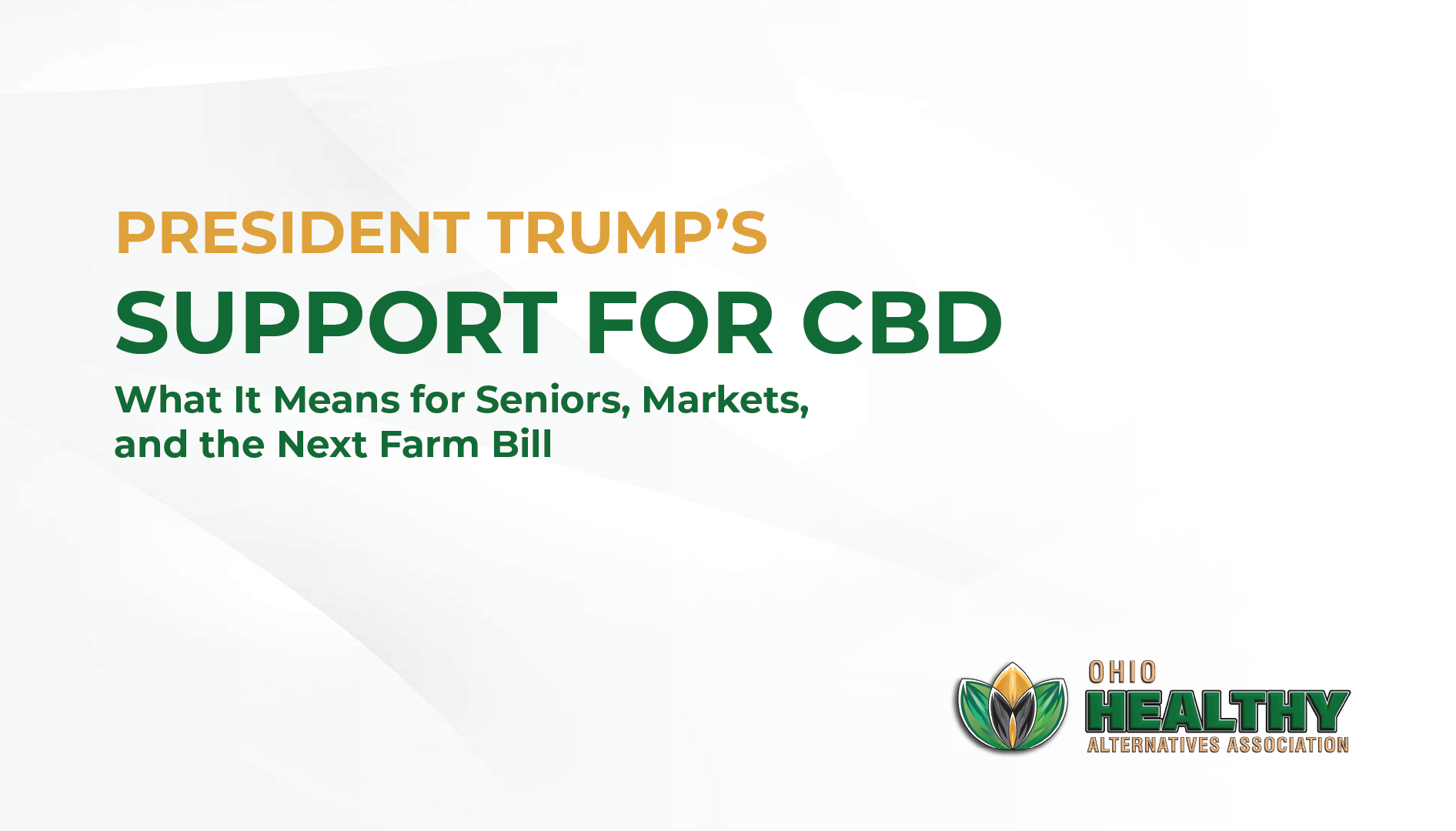
Trump's CBD Endorsement: A Turning Point for Hemp Policy
Trump's CBD Endorsement: A Turning Point for Hemp Policy
President Trump's recent endorsement of CBD for seniors has sent ripples through both political and healthcare circles. This unexpected move could reshape how Americans view hemp-derived products and influence the next Farm Bill negotiations. For an industry that has faced constant regulatory threats, Trump's support represents a significant shift in the political landscape.
The timing couldn't be more critical. As the hemp industry battles restrictive amendments and regulatory uncertainty, high-profile political backing provides much-needed legitimacy. Trump's endorsement doesn't just validate CBD's therapeutic potential—it signals a broader acceptance of cannabis-based healthcare solutions among conservative voters.
This development builds on the foundation established by the 2018 Farm Bill, which Trump signed into law. That legislation transformed hemp from a controlled substance into a legal agricultural commodity, creating a multi-billion-dollar industry virtually overnight. Now, Trump's direct endorsement of CBD products suggests an evolution in his thinking about cannabis policy.
From Prohibition to Acceptance: The 2018 Farm Bill Legacy
The modern hemp industry exists because of the 2018 Farm Bill, which legalized hemp containing less than 0.3% Delta-9 THC. This single piece of legislation created economic opportunities across rural America and established the legal framework for today's CBD market.
The numbers tell the story of hemp's explosive growth. In 2020, the hemp-derived cannabinoid market was valued at just $200 million. By 2024, according to Brightfield Group research, it had reached $3.5 billion. Nearly 7,000 hemp-related businesses now operate across the United States, supporting jobs in manufacturing, agriculture, and retail.
However, this success hasn't come without challenges. The Mary Miller Amendment to the 2024 Farm Bill attempted to ban 90-95% of hemp products by redefining hemp to exclude most cannabinoids. Representative Andy Harris added similar hemp-banning language to appropriations bills. These legislative attacks required massive advocacy efforts to defeat, demonstrating the industry's ongoing vulnerability to political shifts.
Trump's Truth Social Video: A Healthcare Revolution
On September 28, 2024, Trump posted a video on Truth Social that directly endorsed hemp-derived CBD for seniors. The video highlighted CBD's potential to reduce pain, improve sleep, and lower stress levels. More importantly, it positioned CBD as an alternative to addictive prescription medications—a message that resonates with millions of older Americans struggling with chronic conditions.
The endorsement goes beyond simple political positioning. Trump's video specifically called for Medicare coverage of CBD products and physician education about the endocannabinoid system. These policy proposals would fundamentally change how cannabis-based treatments are viewed within mainstream healthcare.
Medicare coverage for CBD represents a particularly bold proposal. Currently, seniors often pay out-of-pocket for hemp products, creating affordability barriers for fixed-income households. Expanding Medicare to cover CBD would make these treatments accessible to millions who currently cannot afford them.
Economic Impact and Market Response
Financial markets responded immediately to Trump's endorsement. Cannabis companies like Canopy Growth and Tilray Brands saw share prices spike in premarket trading, reflecting renewed investor confidence in the sector's political prospects.
This market response reflects broader economic realities. Research published in Health Affairs has shown that cannabinoid-based treatments can reduce healthcare costs when substituted for traditional pharmaceuticals. The potential Medicare savings from CBD adoption could reach billions while improving patient outcomes.
For businesses already operating in the hemp space, Trump's endorsement provides valuable political cover. Companies have struggled with banking relationships, advertising restrictions, and regulatory uncertainty. High-profile political support helps legitimize hemp businesses and could ease some of these operational challenges.
Senior Healthcare: The Perfect Political Bridge
Trump's focus on seniors represents shrewd political strategy. Older Americans represent a reliable voting bloc that traditionally supports conservative candidates. By framing CBD as a senior healthcare issue, Trump avoids the cultural baggage associated with marijuana legalization while still advancing cannabis policy reform.
The senior healthcare angle also addresses real medical needs. Chronic pain affects approximately 50 million American adults, with rates increasing significantly among older populations. Traditional pain management often relies on opioids, creating addiction risks that CBD products could help mitigate.
Sleep disorders and anxiety also plague older Americans at disproportionate rates. CBD's potential to address these conditions without the side effects associated with prescription medications makes it an attractive alternative for both patients and healthcare providers.
Regulatory Challenges Remain
Despite political momentum, significant regulatory hurdles persist. The FDA has consistently refused to regulate CBD as a dietary supplement, creating legal uncertainty for manufacturers and retailers. The DEA has attempted to expand definitions of illegal THC beyond what the 2018 Farm Bill permits.
Federal court rulings have pushed back against these regulatory overreaches. Both the Ninth Circuit and Fourth Circuit have confirmed that hemp-derived products are legal if they meet the 0.3% Delta-9 THC standard established by the Farm Bill. These decisions provide important legal precedents, but regulatory agencies continue to create uncertainty through enforcement actions and policy statements.
The upcoming 2025 Farm Bill reauthorization process will likely bring renewed legislative battles. Prohibitionist amendments are expected to resurface, requiring continued advocacy from industry stakeholders and consumer groups.
Building Bipartisan Support
Trump's CBD endorsement could help build bipartisan support for hemp policy reform. Cannabis issues have traditionally divided along partisan lines, with Democrats supporting broader legalization and Republicans maintaining prohibition stances. By focusing on specific medical applications and senior healthcare, Trump creates space for Republican lawmakers to support cannabis reform without embracing full marijuana legalization.
This strategic positioning aligns with broader trends in cannabis policy. State-level medical cannabis programs have gained support across red and blue states alike. Public opinion polling consistently shows majority support for medical cannabis access, even in conservative regions.
The economic arguments for hemp also transcend partisan divides. Rural communities benefit significantly from hemp agriculture, while urban areas see job creation in manufacturing and retail sectors. These economic benefits provide compelling reasons for lawmakers to support sensible hemp regulations.
Looking Forward: Policy Implications
Trump's endorsement raises important questions about future cannabis policy directions. Will this signal broader support for marijuana rescheduling? Could CBD access become a mainstream Republican policy position? How might this influence other conservative politicians' positions on cannabis reform?
The Medicare coverage proposal deserves particular attention. If implemented, it would represent the first federal healthcare program coverage for cannabis-derived treatments. This precedent could open doors for broader medical cannabis access through federal healthcare programs.
Physician education initiatives also carry significant implications. Medical schools currently provide minimal training on the endocannabinoid system or cannabis therapeutics. Federal support for physician education could accelerate mainstream medical acceptance of cannabis treatments.
The Path Ahead: Advocacy and Action
Political endorsements mean little without sustained advocacy efforts. The hemp industry and its supporters must continue engaging lawmakers, providing economic impact data, and sharing stories from the thousands of businesses and millions of consumers who benefit from hemp products.
Key advocacy priorities include defending against restrictive amendments in the 2025 Farm Bill, supporting Medicare coverage expansion, and promoting sensible federal regulations that protect consumers without stifling innovation. These efforts require coordination between industry stakeholders, consumer advocates, and political allies across party lines.
The American Healthy Alternatives Association continues leading these advocacy efforts, mobilizing grassroots support and providing lawmakers with research-based policy recommendations. Their work demonstrates how organized advocacy can protect emerging industries from regulatory attacks while advancing sensible reform proposals.
Trump's CBD endorsement represents a significant moment in cannabis policy evolution. However, translating political support into concrete policy changes requires sustained effort from everyone who benefits from hemp products. The time to act is now—before the next round of legislative battles begins.
Share




